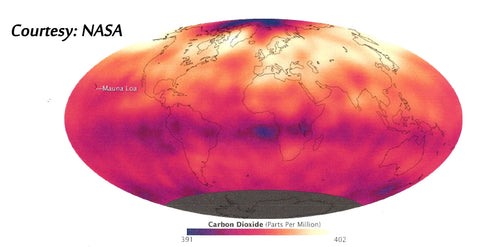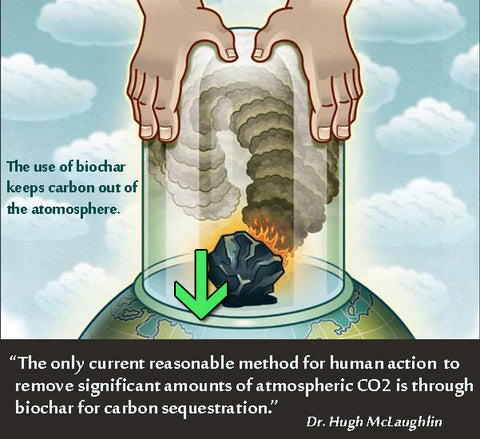Biochar's Role in Offsetting GHGs, Reclamaing Soils, Filtering & Protecting Water
 Carbon dioxide (CO2) often finds itself at the heart of most debates around global warming. Carbon dioxide, due to its molecular structure, is a greenhouse gas, as are Nitrous oxide and methane.
Carbon dioxide (CO2) often finds itself at the heart of most debates around global warming. Carbon dioxide, due to its molecular structure, is a greenhouse gas, as are Nitrous oxide and methane.
Where do these gases come from? The industrial revolution set in motion a rapid release of carbon dioxide due to the burning of fossil fuels.
Also, decay in landfills, burning of wood and agricultural off-gassing have made significant contribution to the high, and unsustainable, release of Greenhouse Gases.
 This release of greenhouse gases has raised the planet temperatures at an alarming rate.
This release of greenhouse gases has raised the planet temperatures at an alarming rate.
Additionally, the increase in temperature also means the decrease of temperature in the winter - more extreme temperatures annually--so floods, erosion and sediment and pollutant-filled waterways occur.
The existence of global warming has had wide-ranging and detrimental impacts and continue to be perilous to water, soil, plants and food security. Temperature is one of the three major influences on global patterns of plant growth.
Along with available sunlight and water, temperature determines whether the land will support dense forests, grassland, or nearly barren desert. Conversely, plants influence how hot the surface of the land can become.
Biochar: Really Carbon-Negative?
Yes, biochar is really carbon negative. Many know that fossil fuels are considered carbon-positive (they add carbon to the air), an alternative, biomass fuels are considered carbon neutral. Biomass fuels are carbon neutral as they avert burning fossil fuels but burn plants or biomass also release carbon into the air. Therefore, the process neither adds, nor subtracts from the levels of GHGs.
Biochar, particularly biochar with high levels of organic carbon, however are carbon-negative, because they actually retain a substantial portion of carbon in the soil, preventing it from escaping into the atmosphere. Biochar can also prevent the escape from fields Nitrous Oxide and Methane.
High-quality carbon, low in ash content will retain carbon in the soil for hundreds, if not thousands of years. While increasing the offset of GHGs, biochar improves soil fertility and stimulates plant growth. These plants breath the CO2 in and breathe out oxygen,improving air quality. That's why it is important to utilize biochar (an otherwise a wasted biomass resource), to help improve soils, plants, waterways and the fish that inhabit them.
Additional Benefits to the Environment
 An additional benefit of biochar with high activity and high porosity, can assist in the Earth's healing on the ground and in the water as well as it very effective in binding to and prevent migration of toxic heavy metals, excess nutrient often caused by pesticides and chemical detergents, PAHs, PCBs and other pollutants that plague many modern watersheds, wetlands, bays, endangered marine life and drinking water.
An additional benefit of biochar with high activity and high porosity, can assist in the Earth's healing on the ground and in the water as well as it very effective in binding to and prevent migration of toxic heavy metals, excess nutrient often caused by pesticides and chemical detergents, PAHs, PCBs and other pollutants that plague many modern watersheds, wetlands, bays, endangered marine life and drinking water.
The adoption of biochar over traditional carbon filtration media, such as mined and chemically-treated activated carbon is a "green alternative" that is quickly being adopted by forward-thinking and pragmatic environmental engineers, soil scientists, wetland managers, land conservation districts, as the media-of-choice for Lower Impact on spoiled areas and in-situ remediation which is less costly. Black Owl Environmental Ultra is Exceptional, Biochar with characteristics of very high surface area, porosity, activity and organic carbon and is ideal for a vast number of applications that will be part of solving these pressing issues. Black Owl Biochar Pure & Natural Ag/Hort, makes the same contributions to the land. Professionals and environmentally educated populations understand preserve and reclaim the earth's soils, the very thing that sustains life.
Biochar: A Call to Action
 Many of the leading minds of our time propose biochar as one of the top, and perhaps only, carbon-negative solutions to current perilous environmental challenges. When addressing global warming, we like to offer hope.
Many of the leading minds of our time propose biochar as one of the top, and perhaps only, carbon-negative solutions to current perilous environmental challenges. When addressing global warming, we like to offer hope.
Bill McKibben, author, professor most commonly known as the activist and founder of 350.org offers a very bright light of hope when discussing biochar. He states, "If you could continually turn a lot of organic material into biochar, you could, over time, reverse the history of the last two hundred years...We can, literally, start sucking some of the carbon that our predecessors have poured into the atmosphere down through our weeds and stalks and stick it back in the ground. We can run the movie backward. We can unmine some of the coal, undrill some of the oil. We can take at least pieces of the Earth and – this is something we haven’t done for quite a while – leave them Better Than We Found Them.”
Biochar: Where do we go from Here?
 Utilize biochar and plant, plant, plant. Grow well, and do good. Subtract from the problem.
Utilize biochar and plant, plant, plant. Grow well, and do good. Subtract from the problem.
Thanks!
